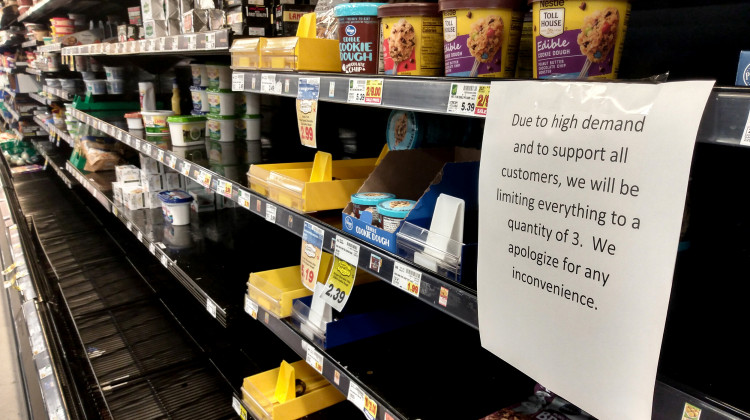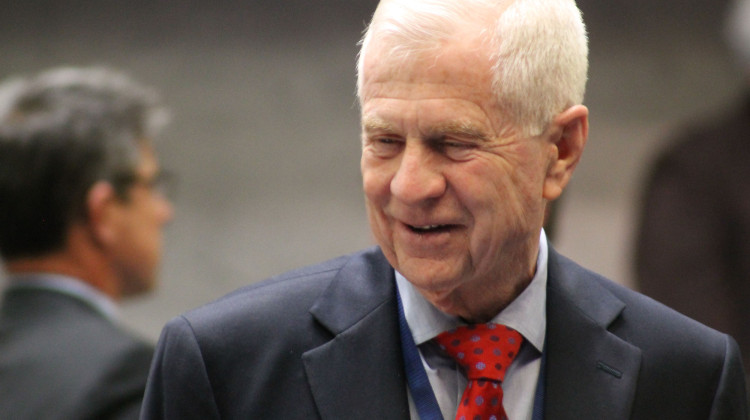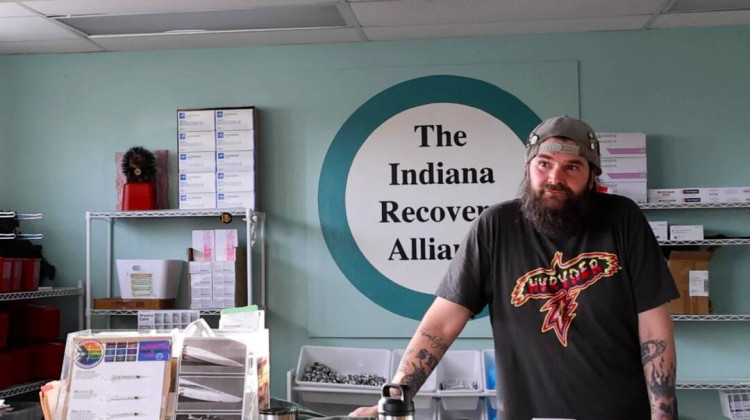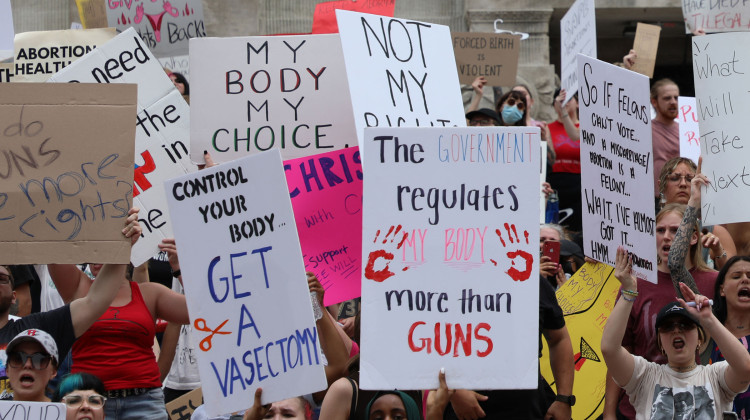
A number of grocery chains, including Kroger, are implementing restrictions on the number of products customers can purchase.
Lauren Chapman/IPB NewsWhat happened this week in Indiana’s COVID-19 response? Gov. Eric Holcomb announced a “Stay-At-Home” order, the state’s primary got pushed back and manufacturers are pivoting to make health equipment.
Four more Hoosiers died over the weekend from the novel coronavirus. The latest deaths came from Delaware, Allen, Marion and Scott counties. All were over the age of 50 and had underlying health conditions. The Scott County resident had been diagnosed with COVID-19 on Friday.
Scott County was at the center of an HIV epidemic in 2015, which is an acquired immunodeficiency syndrome. Scott County Health Department’s Brittany Combs released a video statement in response to the death.
“We in Scott County have a very large immunocompromised population. We all have to work really, really hard at following these rules so we can protect that vulnerable population,” Combs says.
READ MORE: Can I Go For A Walk? Here's What A 'Stay-At-Home' Order Really Does
LEE MAS: ¿Qué Necesita Saber Acerca Del Coronavirus? Tenemos Respuestas.
Gov. Eric Holcomb announced the state would follow a “Stay-At-Home” order for the next two weeks unless they’re conducting “essential business.”
That order, issued Monday, comes ahead of what Holcomb calls a “critical” period to help curb the spread of COVID-19.
“So, stay home," Holcomb says. "Get groceries only when you need them and only buy what you need.”
Compared to other states, one economist says the order is less extreme and could help the economy take less of a hit.
Indiana University Kelley School of Business economist Kyle Anderson says letting some businesses stay open could help lessen the economic impact on the state.
“By keeping businesses open, you know, that might help a little bit,” says Anderson. “But also I think it makes sense because we haven’t seen as severe of an outbreak as other states have.”
He says some of the “non-essential” businesses may have already started seeing fewer customers the last few weeks.
Hair salons, spas, nail salons, tattoo parlors and barber shops are all considered “non-essential.”
Holcomb’s “Stay-At-Home” order went into effect at midnight, but enforcement for both individuals and businesses remained unclear.
Holcomb says his “Stay-At-Home” order is not meant to be a “hammer” but to emphasize the need to socially distance and self-isolate, thus curbing the spread of COVID-19.
“[The police] are not going to be pulling people over going to and from work," Holcomb says. "If we get into a situation where someone is flaunting, we’ll have to address that on a case-by-case basis.”
And Indianapolis-based Eli Lilly and Company Tuesday expanded free COVID-19 testing to first responders in addition to health care workers.
The company started drive-thru testing for active health care workers on Monday. Chief Scientific Officer Dan Skovronsky says the company recognized the need for testing for some of the people in close contact with the novel coronavirus.
Health care workers and first responders who work in Indianapolis are encouraged to contact Eli Lilly to sign up for testing. A doctor’s note is required.
Eli Lilly’s drive-thru test is not available to the public.
Indiana officials are still optimistic the state’s economy will bounce back from the effects of the novel coronavirus.
Congress approved Friday a $2 trillion stimulus package that will help states, businesses and workers. Indiana officials say that will bolster the state’s already strong position to combat economic hardships due to the coronavirus.
Touting the state’s economic stability, Gov. Eric Holcomb says the more than $2 billion in state surplus money can help boost Indiana’s recovery from a recession.
“Hoosiers should know that this is the exact reason why we were so fiscally prudent year after year after year after year,” he says. “When I said we were going to war with this, that wasn’t rhetorical, I didn’t say it for effect. We weren’t trying to amass a surplus for a bumper sticker slogan, it was for this day.”
There are tens of thousands of Hoosiers out of work as of Wednesday. Last week, more than 62,000 filed for unemployment, compared to 3,200 the week before.
The Indiana Election Commission met virtually to approve the change from the governor, which includes scaling back restrictions on vote-by-mail. On Friday, Holcomb and Secretary of State Connie Lawson announced their intention to push the state’s primary back to June 2.
Indiana could move to a vote-by-mail-only primary election this year if the COVID-19 pandemic doesn’t improve in time.
That’s one of the things brought up by the Indiana Election Commission as it finalized the rules this week for the state’s primary.
The state will allow any registered Hoosier to vote via mail-in ballot for the primary, while still allowing in-person voting.
The Department of Correction and businesses have partnered with the state to provide much-needed protective equipment in response to the virus.
Already, it is producing about 200 gowns per day, and Commissioner Rob Carter expects to reach that level of production in masks by Monday. The shop is currently producing 650 12-ounce bottles of hand sanitizer per day.
In a statement, the governor's office said the Department of Correction plans to repurpose another production line at Wabash Valley Correctional Facility to expand the production of protective equipment.
The Indiana National Guard is helping distribute those supplies to hospitals in need.
As of Friday morning, 24 people had died from COVID-19 – there are 981 confirmed cases and more than 7,000 Hoosiers have been tested.
Contact Lauren at lchapman@wfyi.org or follow her on Twitter at @laurenechapman_.
This is a rapidly evolving story, and we are working hard to bring you the most up-to-date information. However, we recommend checking the websites of the Centers for Disease Control and Prevention or the Indiana State Department of Health for the most recent numbers of COVID-19 cases.
 DONATE
DONATE







 Support WFYI. We can't do it without you.
Support WFYI. We can't do it without you.